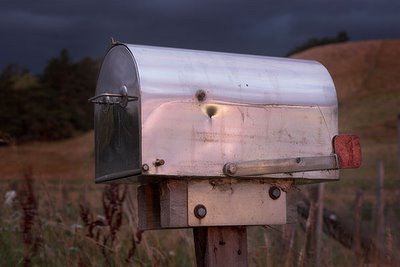 through a land of thorny weeds and desiccated grass, dust and rabbits, rows of windbreak pines on the other side of decrepit wire fences. I saw the way the light faded under those trees: among those pines, in their dim places, bad things might happen: a hitchhiker might disappear, the only trace a discarded jersey or solitary shoe. Places with mysteries that remain unsolved; places that enter NZ history and folklore and, eventually, mythology. Yet, despite the sense of foreboding, the land didn't feel evil: just sad, old, and irredeemable.
through a land of thorny weeds and desiccated grass, dust and rabbits, rows of windbreak pines on the other side of decrepit wire fences. I saw the way the light faded under those trees: among those pines, in their dim places, bad things might happen: a hitchhiker might disappear, the only trace a discarded jersey or solitary shoe. Places with mysteries that remain unsolved; places that enter NZ history and folklore and, eventually, mythology. Yet, despite the sense of foreboding, the land didn't feel evil: just sad, old, and irredeemable. I think it was the light.
Everywhere, the land seemed to hold stories. I watched it pass by as I drove and thought, if I’d been alone I’d have stopped, walked away from the car and listened for a long time. It’s the land of poets and listeners and people who say nothing.
We were driving to Te Anau, and the Eglinton Valley, and the Darrans: places I’d never been; places—the Darrans especially—I’ve known since childhood. On to Lake Adelaide and the hard granite of Sabre.
I drove on, feeling as I were driving forward into my own history.
Photo 1: Enough of fluffy photos of little birds! Here's something entirely different; it's my neighbour's mailbox, back here in the Pohangina Valley, photographed two days ago—the same evening I took the background photo for the blog header (that was almost from my back door). More little fluffy birds coming soon...
Photo and words © 2006 Pete McGregor
7 comments:
What a fascinating observation. I felt the stories in the land most keenly in Ireland. Here, that sense comes more from old barns or small forgotten towns.
Good travels!
Gwyn, I agree: it's often easiest to get that sense where there's evidence of past human activity. I haven't been to Ireland (yet), but I can trace part of my ancestry back there — not to mention those sessions at the Celtic ;^) I remember seeing the film Letters to Send a year or two ago; it's about a documentary filmmaker retracing Dorothea Lange's visit there. I found much of it strangely moving — almost familiar.
On the other hand, places very far from obvious human influence are often full of power, particularly if I take the time to listen (which I try to do).
Thanks for the comment :^)
Yes, it seems that some places possess a kind of power... certain rock formations, forests and often sections of rivers.
Nice shot of the neighbour's mailbox! By the look of it, mailboxes everywhere must be subjected to some of the same indignities -- whether it's being used for target practice or bumped into by a snow plow! (-:
Interesting that you should mention sections of rivers, Bev. When I wrote that, I had in mind one of the upper reaches of the Pohangina River. Apparently, there is also a place in the Valley where horses will not go; they cannot be forced to approach it, yet to humans it appears perfectly unremarkable.
You're right about the indignities suffered by mailboxes, although the favoured objects for target practice seem to be road signs, and the nearest snow ploughs are a very long way away.
And how much the light shapes the moods and the character of place.
I find it odd about the horses not wanting to go to a certain place. Of course the pragmatic part of me thinks that there must be some physical reason for it, footing that annoys or some sort of thing like that. Or most likely a story that has grown up against one persons horse that refused to go, the story that is better told when everyone remembers someone else's horse that refused to enter also.
I love those places where the light is just right and the earth's history seems to reveal itself. Any place that evokes that kinship in me, where I feel connected to every living thing that has ever breathed its breath here, is as holy a place I've ever set my foot.
Clare: Yes, both your suggestions make sense (which is why I prefixed the statement with "apparently"). Stories, like species, do evolve (in the broad sense); and the senses of animals are mostly so much more acute than ours. I wonder what it is that the horses may be aware of? Makes me wonder, for example, what happens to birds migrating over magnetic anomalies.
RD: I don't think it could be said better. For me, the challenge is to keep extending the range of places where I feel what you describe.
Thanks to you both for your thoughts.
Post a Comment